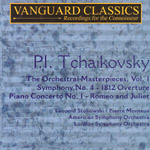Listeners familiar with Leopold Stokowski’s work will know to expect a highly idiosyncratic rendition of Tchaikovsky’s Symphony No. 4. He doesn’t disappoint, as this performance brims with his characteristic subtle (and not so subtle) re-orchestrations and wildly free phrasing and rubato. From the opening fanfare, with its artificially induced sforzando and crescendo, to his very Italianate treatment of the main theme (he dramatically prolongs the first note each time it appears), to the finale’s extreme shifts in tempo, this is a Stokowski performance through and through. That the American Symphony Orchestra manages to keep up with the conductor’s impulsive manipulations is quite impressive. So, while this isn’t a performance that best represents the composer’s intentions, it’s undeniably a Tchaikovsky Fourth unlike any other, and very well recorded to boot. The 1812 Overture (with Mario Rossi and the Vienna State Opera Orchestra) gets more or less standard treatment, but the dim mono recording greatly diminishes its sonic impact.
After Stokowski, Pierre Monteux’s Tchaikovsky sounds relatively straightforward, but his performances are enthralling nonetheless. Monteux leads a meticulously planned yet passionate account of Romeo and Juliet–the slightly subdued opening gives little hint of the rapturous climax to come. In the Piano Concerto No. 1, Monteux’s arch musicianship, taste, and sensitivity make an ideal foil for John Ogdon’s brilliant yet highly personalized traversal of the solo part. Ogdon certainly has a massive-toned instrument at his disposal, but instead of banging away to create a sonic torrent, his caressing touch produces a richly sonorous tone that adds greater depth to the music. This live performance catches the pianist in the heat of the moment, firing off kinetic energy that occasionally overwhelms his fingers (especially in the too-fast central section of the second movement). But if anything this adds to the excitement of the event. Ultimately, it’s a performance every pianophile should hear. Vanguard’s clear and present recording projects a large acoustic that neatly balances the soloist and orchestra.
































